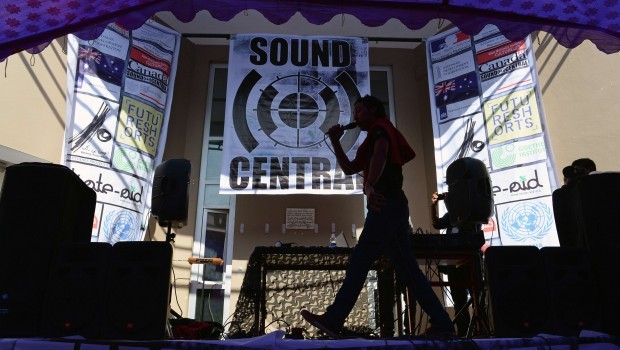
An Afghan youth performs onstage during “The Sound Central Festival” at the French Cultural Center in Kabul on May 1, 2013. Source: AFP Photo/Sham Marai
Kabul, Reuters—More than 400 Afghan women and girls jumped from their seats, screaming and even headbanging to rock and rap music at an all-female music festival in the capital of Kabul, which organisers say was the largest such event in the country’s history.
It may also be one of the last. In ultra-conservative Afghanistan, women’s rights remain precarious.
Afghan women have won back hard-fought rights such as education and work since the Islamist Taliban was toppled 12 years ago, but there are fears these freedoms could shrink once NATO-led forces withdraw from Afghanistan by the end of next year, ending their fight against a Taliban-led insurgency that began in late 2001.
“I’m worried that when the troops leave, we’ll be stuck in our homes like we were in the past,” said 16-year-old student Shabona Nabizada, shouting above the din of electric guitar.
“As women we’re ridiculed and harassed. I feel free being able to come here and leave all that behind,” she added with a timid smile.
The rare women’s day, part of a multi-day Sound Central concert, was held in a city concert hall on Tuesday and drew a boisterous crowd – mostly teenagers in the high school uniform of grey tunic and white hijab, but also abuse victims from shelters and even a few grandmothers.
Increasing insecurity is deterring some women from pursuing work outside the home, and rights workers accuse the government of not doing enough to safeguard women – claims that President Hamid Karzai’s administration denies.
The women-only festival kicked off the 4-day Sound Central rock fest, now in its third year, featuring acts by Afghan-American singer Ariana Delawari and Kabul-based expat rockers White City, whose British lead singer Ruth Owen sent the crowd into a frenzy.
The number of women attending the women’s day more than doubled from last year’s debut event, said its founder, Australian multimedia producer Travis Beard. He publicised the concert by sending out fliers and teams of women to schools to convince teachers and parents that the festival would cause young women no harm.
“Women’s day is the most significant part of the festival. Just having this kind of attendance for the first time in the country, at a rock concert, is groundbreaking,” Beard said.
As local rap artist Ramika took to the stage, dressed in turquoise leggings and an oversized t-shirt, several wide-eyed Afghan soldiers guarding the event crept in to steal a look at the show, which only female press members were allowed to cover.
To one side of the audience sat a small, solemn group of young women from shelters that give refuge to abuse victims, many of whom have escaped violent homes and unhappy arranged marriages. The unmarked and often hidden shelters around the country face an uncertain future, with recent government attempts to bring them under their control.
Last year, Justice Minister Habibullah Ghaleb called the shelters houses of “prostitution and immorality”, provoking a barrage of condemnation from Afghan women.
One shelter director, who only gave her first name, Horshid, said coming to the music festival was a way to “temporarily bring the girls back to life”.
Horshid, who runs a shelter attached to the Afghan Women’s Skills Development Center, a non-governmental organisation, said women are increasingly concerned by the government’s attempts to establish peace talks with the Taliban.
“If the Taliban regain any power, our rights will be the first sacrifice,” she said.
